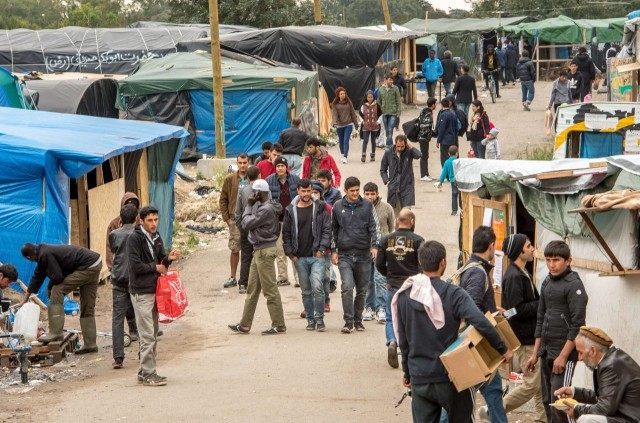The residents of the Calais camp known as The Jungle have set up shops, churches, and even a functioning nightclub replete with disco lights and cheap beer, turning the area into a functioning shanty town.
In sharp contrast to the images of desperate women and children fleeing from the fighting in the Middle East which has prompted so many to carry out relief convoys to the French port, the majority of the 5,000 migrants sheltering in the area are fit young men looking to come to the UK for work.
And despite a focus on helping refugees fleeing the Assad regime and ISIS, most are not even Syrian. Instead they travel from across Africa, the Middle East and beyond, mostly from Eritrea, Somalia, Pakistan, Sudan and Nigeria.
During the day they try to board vehicles bound for Britain in the hope of finding work. Those who fail head back to the camp where they are given meals and clothing by charities and individuals eager to help. A library, called Jungle Books has been set up to lend the thousands of books which have been donated. The men are even able to charge their smartphones to surf the net.
In the evening they’ll head to the camp’s restaurants and cafes where some enterprising souls are doing brisk trade, or even to the camp’s nightclub where they can buy a beer for 75p a pint, cheaper than in Britain’s students unions.
“People come here to dance, have a beer and try to feel like they are back home in their own country.” Nigerian national Zimako, who runs it, told the Express.
“We have all seen the images in the media, over the last few weeks, of desperate migrants making their way across Europe; of burning tires on French motorways and of migrants climbing into trucks, hoping to reach the UK,” Ukip’s defence spokesman Mike Hookem MEP told his party’s conference audience yesterday.
“However, the media’s version of events in no way tells the whole story,” he said.
Prompted by an email from a haulier pleading for help, Hookem has travelled repeatedly to northern France to see the situation for himself. While on his trips he has been threatened with a gun, tear gassed in a riot and climbed the fence to the Eurotunnel twice – the second time to prove to the media that it could be done.
“To be honest, what I found in Calais shocked me to my core and I couldn’t quite believe the dangers British hauliers were facing,” he recounted.
“While I have every sympathy for those fleeing from the dangers of war, many of those I found in Calais and the rest of Northern France were not fleeing Syria, Afghanistan or Iraq like the media will have you believe.
“Instead, I found Eritreans, Somalis, Sudanese, Pakistanis and Nigerians, who had no legal right to enter the UK, but who were determined to come here anyway.
“There were also few families, children or even women.
“What I did see were thousands of young men aged between 20 – 35, roaming the streets, sitting in makeshift camps that boast shops, churches, mosques and nightclubs; waiting for their chance to get to Britain.
“And while I did meet a few genuine refugees, the vast majority of the people I met were economic migrants, many of whom were already deep in the clutches of the organised gangs of people traffickers who operate openly across the whole of Northern France.”
Hookem rejected suggestions by the EU Commission’s President Jean Claude Junker that the migrant crisis is Britain’s problem. Rather, he said: “The migrant crisis is only a symptom of the wider ranging political disease that the EU represents.
“Now is the time to reject the dictatorial EU project that threatens our heritage, our traditions and our way of life.”

COMMENTS
Please let us know if you're having issues with commenting.